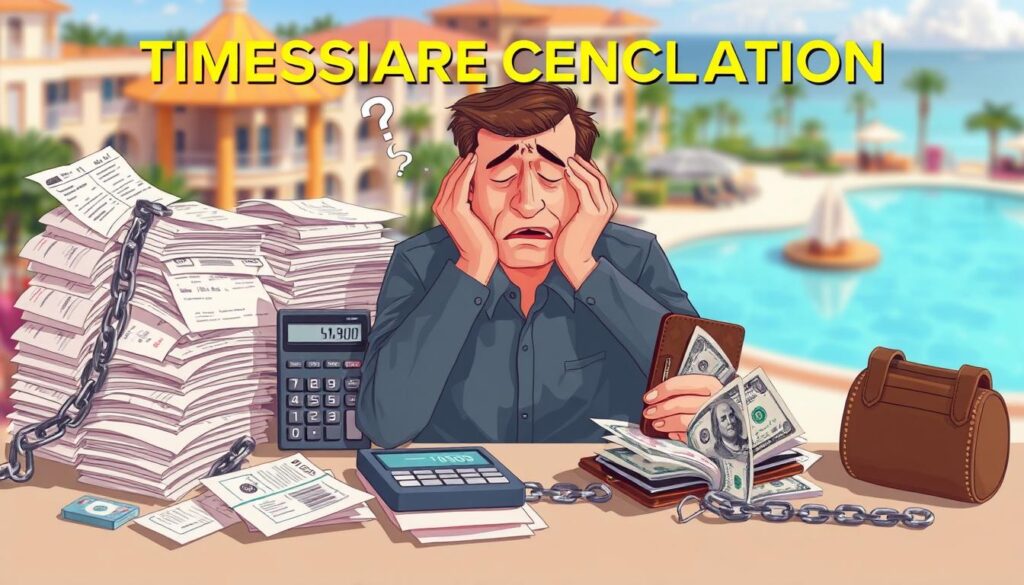Dealing with timeshare ownership can be tough, especially when you think about the money it takes to get out. The cost to cancel a timeshare can change a lot, based on different things. In this guide, we’ll look at the costs, your legal rights, and ways to lower the cost of cancelling a timeshare.

Key Takeaways
- The cost to cancel a timeshare can range from a few hundred dollars to tens of thousands, depending on the specific circumstances.
- Understanding your legal rights and the timeshare contract’s rescission period is crucial in determining the best course of action.
- Exploring professional timeshare exit companies versus a DIY approach can significantly impact the overall cost of cancellation.
- Navigating hidden fees and additional expenses, such as maintenance fees and legal costs, is essential to budgeting for timeshare cancellation.
- Timing and negotiation strategies can help reduce the financial burden of timeshare cancellation.
Understanding Timeshare Cancellation Basics
Dealing with timeshare cancellation can seem tough. But knowing your legal rights, rescission periods, and common methods helps a lot. Timeshare contracts have rules for canceling them. It’s key for owners to know these rules.
Legal Rights in Timeshare Contracts
Timeshare contracts list the rights and duties of both sides. They cover usage, fees, and how to cancel. Reading the contract well helps owners know their options.
Rescission Periods Explained
Most contracts have a cooling-off period, or rescission period. This lets owners cancel within a few days to weeks. It’s a chance to change their mind without big penalties.
Common Cancellation Methods
- Written Cancellation: Owners can cancel by sending a written notice to the resort. This must be done within the rescission period.
- Negotiated Buyout: Owners might negotiate a buyout with the resort. This means selling back the timeshare or getting it canceled for a payment.
- Transfer or Deed-Back: Owners can also transfer the timeshare to someone else or give it back to the resort. This depends on the contract’s rules.
Knowing these basics helps owners feel more in control. They can then choose the best way to cancel their timeshare.
The Average Cost Range for Timeshare Cancellation
When it comes to typical cancellation fees and the price range for timeshare exit, costs vary a lot. The cost estimates depend on several things. These include the contract terms, the cancellation method, and any legal or administrative fees.
The cost to cancel a timeshare can range from a few hundred dollars to several thousand dollars. Here’s a closer look at the typical cancellation fees you might encounter:
- Rescission period cancellation: Often free or a nominal administrative fee (typically less than $200)
- Voluntary surrender or deed-back: Ranging from $500 to $2,000, depending on the resort and legal fees
- Hiring a professional timeshare exit company: Typically $2,000 to $6,000 or more, depending on the complexity of the case
- Legal cancellation through the courts: Can cost $5,000 or more, with additional legal fees and court costs
It’s important to note that the price range for timeshare exit can change. The cost estimates may vary based on your specific situation. Thoroughly researching and understanding the options can help you make an informed decision on the best approach to cancel your timeshare.
“Canceling a timeshare can be a complex and costly process, but it’s important to explore all options to find the most suitable solution for your needs.”
Professional Timeshare Exit Companies vs. DIY Approach
Deciding to cancel a timeshare can be tough. You might choose to work with professional timeshare exit companies or try to do it yourself. Each method has its pros and cons, and knowing the costs and benefits is key to making the right choice.
Benefits of Professional Services
Timeshare exit companies know the legal ropes of canceling a timeshare. They handle the paperwork and talk to the resort for you. This is great for those new to the process or who’ve hit roadblocks before.
Self-Cancellation Process Steps
- Thoroughly review the timeshare contract and understand your legal rights
- Explore options for cancellation, such as the rescission period or negotiating with the resort
- Prepare and submit the necessary documentation to the timeshare company
- Persistently follow up on the cancellation request and be prepared to navigate any legal hurdles
Cost Comparison Analysis
The cost to cancel a timeshare can differ a lot. Professional companies charge a fee, which can be hundreds to thousands of dollars. Doing it yourself might cost little to nothing upfront but takes a lot of time and effort. It’s important to weigh the costs and benefits to choose the best option for you.
| Factors | Professional Timeshare Exit Companies | DIY Cancellation |
|---|---|---|
| Average Cost | $500 – $5,000+ | $0 – $200 (legal fees) |
| Time Commitment | Minimal (handled by the company) | Significant (research, paperwork, communication) |
| Success Rate | Typically higher (leveraging expertise) | Varies (dependent on individual’s skills and persistence) |
| Stress Level | Lower (handled by professionals) | Higher (navigating the process alone) |
Choosing between professional timeshare exit companies and DIY cancellation depends on your needs, budget, and comfort level. Understanding the costs and benefits helps you make a choice that fits your situation best.
How Much Does It Cost to Cancel a Timeshare Through Legal Channels
Ending a timeshare contract legally can be complex and expensive. The costs depend on several factors. Understanding these costs is key for those wanting to exit their timeshare.
Legal fees for canceling a timeshare can be high. An experienced attorney can cost between $1,500 to $10,000 or more. These fees cover the attorney’s time, research, and legal representation.
Court expenses also add to the total cost. Filing fees, court costs, and other charges can be between $500 to $2,000 or more. This varies by location and case specifics.
The total cost of legal timeshare cancellation varies. It depends on several factors:
- Complexity of the timeshare contract and legal issues involved
- Jurisdiction and location of the timeshare resort
- Experience and expertise of the attorney
- Potential need for expert witnesses or additional legal services
- Duration of the legal process
Deciding to go legal for timeshare cancellation is a big step. It’s important to consider the costs and success chances. A good timeshare attorney can help understand the costs and chances of success.

Hidden Fees and Additional Expenses in Timeshare Cancellation
Canceling a timeshare can be tough, with hidden costs popping up. It’s key to know these costs if you want to cancel your timeshare.
Maintenance Fee Obligations
Maintenance fees are a big cost with timeshares. Even when you start canceling, you might still have to pay these fees. These ongoing maintenance fees can quickly add up, leading to unexpected cancellation costs.
Transfer and Documentation Costs
Canceling a timeshare means transferring ownership or giving it up. This step comes with transfer charges and fees for documents. These transfer charges are extra costs to consider when planning to cancel.
Potential Legal Expenses
Legal issues might come up during cancellation, like disputing contract terms. These legal expenses can raise the total cost, especially if it’s a long and complex process. Owners should be ready for unexpected cancellation costs from legal fees.
| Expense Type | Description | Estimated Cost Range |
|---|---|---|
| Ongoing Maintenance Fees | Fees owed to the resort until the timeshare is officially transferred or relinquished | $500 – $2,000 per year |
| Transfer Charges | Fees associated with the transfer of timeshare ownership or relinquishment | $200 – $1,000 per transaction |
| Legal Expenses | Potential costs of legal representation or disputes during the cancellation process | $1,000 – $10,000 or more |
Knowing about hidden fees and additional expenses helps owners plan for the full cost of canceling. This way, they can make smart choices about how to proceed.
Factors Affecting Timeshare Cancellation Costs
The cost to cancel a timeshare can change a lot. This is because many things can affect it. Knowing these factors is key when you want to cancel your timeshare.
The complexity of the timeshare contract is a big factor. If your contract has lots of complicated terms or hidden clauses, canceling it can be harder. This often means you’ll have to pay more. Getting help from a lawyer can add to the cost.
The resort’s policies and procedures also matter a lot. Some resorts charge a lot for canceling or make it hard to do so. They might do this to keep owners from leaving. These policies can really affect how much you’ll pay to cancel your timeshare.
Other things like how long you’ve owned the timeshare, where it is, and any money you owe can also change the cost. If you’ve had your timeshare for a long time or owe money, canceling it might cost more. You might face more challenges and higher fees.
| Factor | Impact on Cancellation Cost |
|---|---|
| Contract Complexity | Higher complexity leads to increased legal and professional fees |
| Resort Policies | Restrictive policies can result in additional fees and expenses |
| Duration of Ownership | Longer ownership often means more outstanding financial obligations |
| Timeshare Location | Certain resort locations may have higher cancellation costs |
Understanding these cost influencing factors helps timeshare owners get ready for the costs of canceling. They can look for ways to lower these expenses when ending their timeshare contract.
Legitimate Ways to Reduce Timeshare Cancellation Expenses
Getting out of a timeshare can be tough, but there are real ways to cut costs. You can use negotiation, timing, and financial help to save a lot. This can help you avoid spending thousands to end your timeshare deal.
Negotiation Strategies
One top way to lower costs is through smart negotiation. Negotiating cancellation fees with the resort can save you a lot. Be ready to explain why you need a lower fee, like if you’re facing hard times. Being professional and polite can help you get a better deal.
Timing Considerations
The time you choose to cancel your timeshare matters. Try to cancel during the rescission period to avoid extra fees. Also, keep up with local laws and changes. This can help you find ways to save money and avoid extra costs.
Available Financial Options
- Look into financial help from groups that support timeshare owners. They might offer grants or loans to help with cancellation costs.
- Check if your insurance, like homeowner’s or renter’s, covers timeshare costs. You might get some money back.
- See if you can get tax breaks for your cancellation costs. This could lower what you owe.
Using these strategies can make canceling your timeshare easier and cheaper. Stay proactive, informed, and keep pushing for the best deal. This way, you can save money and move on from your timeshare.
Warning Signs of Timeshare Exit Scams
In the complex world of timeshare cancellation, it’s crucial to be vigilant against fraudulent exit companies. These scams can cost owners thousands of dollars without actually ending their timeshare agreements. It’s important to know the common red flags of these fraudulent exit companies.
- Unrealistic promises of a “guaranteed” timeshare exit or refund
- Demands for upfront, non-refundable fees before any work is done
- Lack of transparency about the actual cancellation process and timeline
- High-pressure sales tactics, including unsolicited phone calls or emails
- Unwillingness to provide references or a physical business address
By staying informed and proactive, timeshare owners can protect themselves from these scam prevention tactics. This ensures a successful, legitimate timeshare cancellation. It’s important to research any company before entrusting them with your timeshare exit. Verify their credentials and track record.
| Red Flags of Fraudulent Exit Companies | Characteristics of Legitimate Providers |
|---|---|
| Unrealistic promises of a “guaranteed” timeshare exit | Transparent about the cancellation process and timeline |
| Demands for upfront, non-refundable fees | Offer customized solutions and clear pricing structure |
| Lack of transparency about the actual process | Provide references and a physical business address |
| High-pressure sales tactics | Prioritize the client’s best interests |
By recognizing these fraudulent exit companies and red flags, timeshare owners can navigate the cancellation landscape with confidence. Avoiding scam prevention tactics is key. Taking the time to thoroughly vet any potential provider is the best way to ensure a successful and stress-free timeshare exit.

Timeline for Timeshare Cancellation Process
Getting out of a timeshare can be tough and slow. Knowing the usual timeline helps you plan better. Let’s look at the main steps and what you need to do.
Documentation Requirements
To cancel your timeshare, you need the right papers. You’ll have to collect and send:
- A copy of your timeshare contract or agreement
- Proof of ownership, such as a deed or title
- Identification documents like a driver’s license or passport
- Any relevant correspondence with the timeshare company
- Detailed written request for cancellation
Processing Periods
The cancellation timeframe varies a lot. It depends on the timeshare company and how you cancel. Usually, it takes 4 to 12 weeks, but it can take months.
Working with a professional timeshare exit company can speed things up. They handle the required documents for you. But, if you’re doing it yourself, it might take longer.
Being patient and persistent is important. Timeshare companies might try to slow down the cancellation timeframe or make it hard to get the required documents. With the right steps and papers, you can get out of your timeshare.
“Persistence and attention to detail are crucial when cancelling a timeshare. The process can be lengthy, but with the right strategy, you can successfully reclaim your financial freedom.”
Legal Implications of Timeshare Cancellation
Canceling a timeshare contract can lead to serious legal problems. If you don’t meet the agreement’s terms, it might be seen as a contract breach. This could result in legal action from the timeshare provider.
They might ask for damages or fees, which could hurt your credit score and finances.
Before you start the cancellation process, it’s important to know the legal side. Talking to a lawyer can help you understand the steps and avoid legal trouble. It’s key to read your contract carefully, know your rights, and look into all legal options.
Understanding the legal side of timeshare cancellation is crucial. Knowing the possible outcomes helps you make a smart choice. It also protects your legal and financial well-being.
FAQ
What are the legal rights in a timeshare contract?
Timeshare contracts give owners certain rights. They can use the property during set times. They also have to pay maintenance fees. And they know the rules for canceling or transferring the agreement.
What is a rescission period?
A rescission period is a short time, usually 3-10 days. It lets owners cancel their contract without penalties or fees.
What are the common methods for canceling a timeshare?
There are a few ways to cancel a timeshare. Owners can use the rescission period, talk to the resort, sell or transfer it, or go to court.
What is the typical cost range for timeshare cancellation?
Canceling a timeshare can cost a lot. It can be a few hundred dollars for a simple exit. Or it can be thousands for legal help or professional services.
What are the benefits of using a professional timeshare exit company?
Professional companies offer many services. They help with legal issues, negotiate, and handle the termination process. This can save time and money compared to doing it yourself.
What are the steps involved in a self-cancellation process?
Self-canceling involves a few steps. First, review the contract. Then, use the rescission period if you can. Next, try to negotiate with the resort. If that fails, you might need to go to court.
How much do legal fees typically cost for timeshare cancellation?
Legal fees vary a lot. They depend on the case’s complexity, location, and the lawyer’s skill. Costs can be a few hundred dollars for simple cases or thousands for more complex ones.
What hidden fees and additional expenses should I be aware of when canceling a timeshare?
Be aware of hidden costs. These can include ongoing fees, transfer costs, and legal fees if needed.
What factors can influence the cost of timeshare cancellation?
Several factors affect the cost. These include the contract’s complexity, the resort’s policies, the location, and your personal situation.
What are some legitimate ways to reduce timeshare cancellation expenses?
To save money, negotiate with the resort. Try to time the cancellation right. Look for financial help or programs.
What are the warning signs of timeshare exit scams?
Watch out for scams. Look for high upfront fees, unrealistic promises, lack of transparency, and no customer references.
How long does the timeshare cancellation process typically take?
The time it takes varies. It depends on the documents needed, the resort’s process, and the case’s complexity. It can take weeks or months.
What are the potential legal implications of timeshare cancellation?
Canceling a timeshare can have legal effects. It can lead to contract breaches, legal issues, and affect your credit score. Knowing the legal side is key to avoid problems.



